Nigeria's Biblical connections: an engaging exploration of potential ties to lost Israelite tribes and Biblical history.

Nigeria in the Bible
Navigating through the historical labyrinth of Biblical times, you might wonder about Nigeria's place in the Holy Scriptures. While the Bible doesn't explicitly mention Nigeria, there are references to Africa and even theories connecting Nigeria to the lost tribes of Israel.
Thus, the question arises: can the intricate tapestry of Biblical history weave in the narrative of Nigeria? We'll examine archeological evidence, explore scholarly debates, and interpret potential links in our quest to unravel this intriguing possibility.
Won't you join in this fascinating exploration?
Key Takeaways
- Nigeria's rich history and ethnic diversity offer unique perspectives on biblical interpretations and narratives.
- Connections between African spirituality and biblical prophecy suggest potential links to ancient Israel.
- Artifacts and linguistic resemblances in Nigeria hint at a possible lineage connection to the Lost Tribes of Israel.
- Scholarly debates continue to explore the intriguing ties between Nigeria's historical context and biblical references.
Historical Context of Nigeria
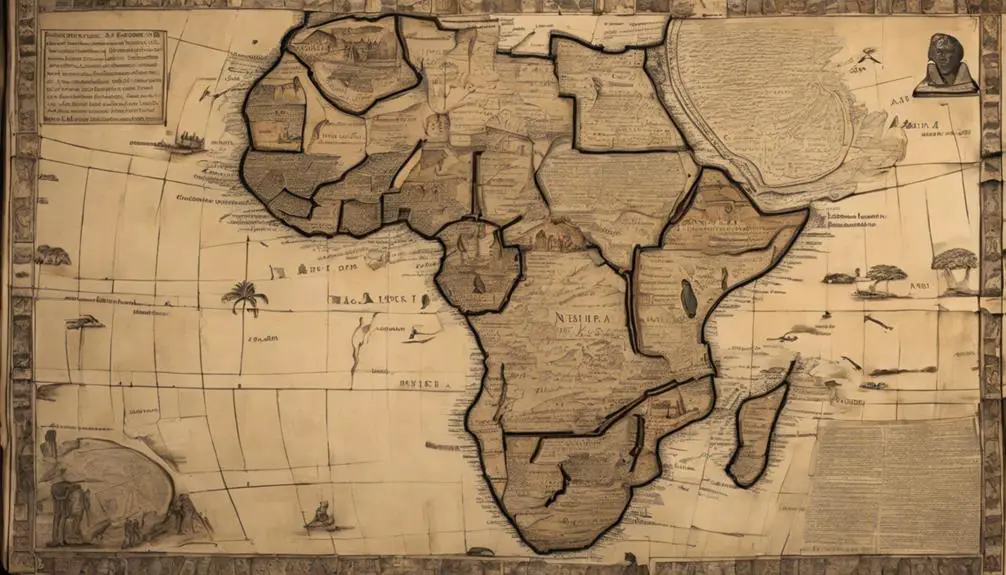
To fully grasp Nigeria's presence in the biblical context, you must first delve into the rich tapestry of its historical background. Nigeria's past is a complex web of Colonial Impacts and Ethnic Diversity, both of which have significantly shaped its present-day identity. The British colonizers, who held sway from the late 19th century through the mid-20th century, left a profound imprint on the country's socio-political and religious landscape.
The colonial legacy is visible in the predominance of Christianity, particularly in the southern regions. However, it's in the Ethnic Diversity where Nigeria truly stands out. With over 250 ethnic groups, each with its own language and tradition, Nigeria is a vibrant mosaic of cultures. This diversity, while enriching, has also been a source of conflicts and misunderstandings, especially regarding religious beliefs and practices.
Understanding this historical context is key to appreciating Nigeria's biblical relevance. It's through the lens of history that you can discern the intricate interplay between colonial influences and indigenous traditions, between universal Christian doctrines and localized interpretations. Thus, Nigeria's history serves as a crucial backdrop, illuminating its place in the biblical narrative.
Biblical References to Africa
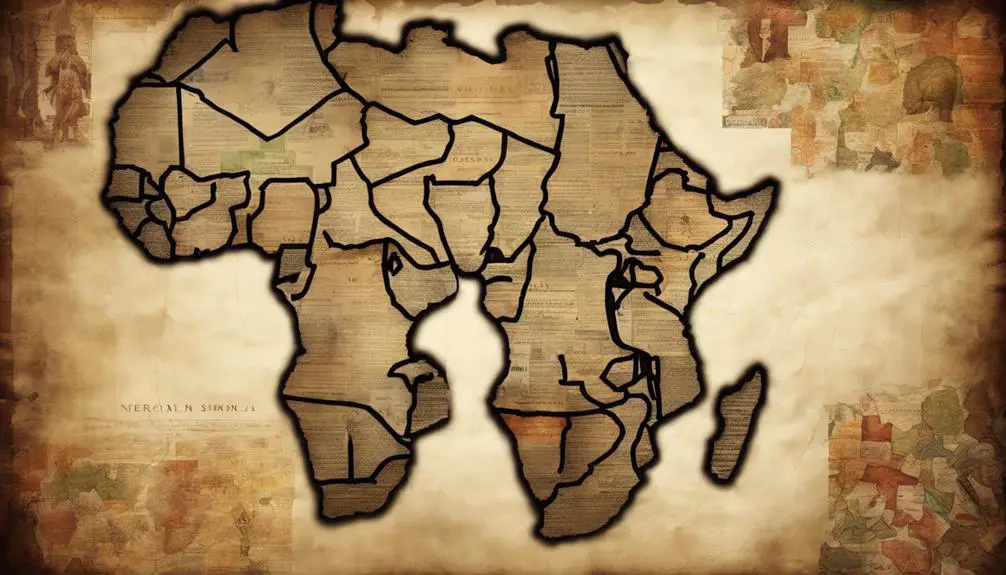
In examining the Bible, you'll find numerous mentions of Africa, shedding light on how this continent intersects with critical biblical narratives. Africa, specifically Egypt and Ethiopia, played pivotal roles in biblical stories. This context is imperative when understanding the Bible's African Prophets and their contributions.
The Prophet Moses, for example, spent significant time in Egypt. The African Prophet, Zephaniah, was of Cushite descent, representing Ethiopia. These figures highlight how the Bible acknowledges Africa's significant role in its narratives. Biblical Interpretations often overlook these connections, but they're crucial for a comprehensive understanding of the text.
Africa's influence on the Bible goes beyond geographical location. You'll find that African culture, wisdom, and experiences shaped the Bible's overall message. The Queen of Sheba's encounter with King Solomon, for instance, displays Africa's intellectual contribution to biblical wisdom literature.
Analyzing these references deepens your understanding of the Bible's multicultural composition. It's clear that Africa wasn't a mere backdrop but a significant contributor to biblical narratives. This perspective challenges conventional interpretations, offering a more inclusive understanding of the Bible. It's important to recognize Africa's role to grasp the Bible's full richness and diversity.
Ancient Civilizations in Nigeria
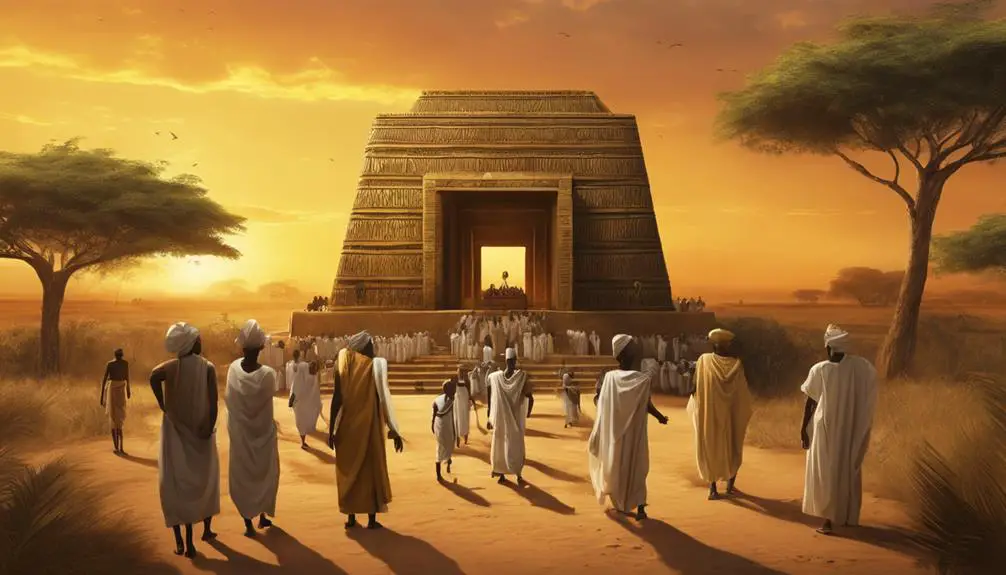
Delving into Nigeria's ancient history, you'll uncover a rich tapestry of civilizations that have greatly influenced the socio-cultural dynamics of the region. From the ancient Nok civilization, known for their remarkable terracotta sculptures, to the former Kingdom of Benin, renowned for its bronze art, Nigeria's past is steeped in a wealth of cultural traditions.
Your Nigerian myths exploration wouldn't be complete without diving into the tales of these civilizations. Each had their unique mythology, offering us invaluable insights into their belief systems and societal structures. The cultural traditions analysis further underscores the depth of their socio-cultural impact, even in modern times.
The Nok civilization, for instance, believed in a life after death and communicated this through their intricate terracotta sculptures. The Kingdom of Benin, on the other hand, had a complex political system, reflected in their bronze plaques depicting royal scenes.
While these civilizations have long since passed, their legacies persist within the cultural fabric of Nigeria. Their myths and traditions continue to influence contemporary art, literature, and societal norms, attesting to their timeless relevance. As you delve deeper, you'll appreciate the vast impact of these ancient civilizations on Nigeria's cultural landscape.
Possible Biblical Connections

Building on the legacies of these ancient Nigerian civilizations, you might find intriguing the potential biblical connections that exist within the country's rich historical tapestry. With a deep dive into historical narratives and religious texts, one can unearth the subtle ties between African Spirituality and the Bible.
Consider for a moment the prophetic traditions inherent to both African Spirituality and Biblical Prophecy. The ability to foresee events, a common trait among prophets in the Bible, is also seen in African spiritual leaders. Another connection lies in the emphasis both place on ancestral reverence and the belief in a supreme being.
Here's a table to further illustrate:
Connection |
African Spirituality |
Biblical Prophecy |
|---|---|---|
Prophetic Traditions |
Existence of Spiritual Leaders with foresight |
Existence of Prophets |
Ancestral Reverence |
Veneration of Ancestors |
Honor for Patriarchs |
Belief in a Supreme Being |
Belief in a High God |
Belief in God |
Such correlations raise fascinating questions about the possible influence and cross-pollination between these two religious schools of thought. As you explore further, you'll encounter more complex and profound connections, each adding a new layer of understanding to Nigeria's biblical ties.
Nigeria and the Lost Tribes of Israel
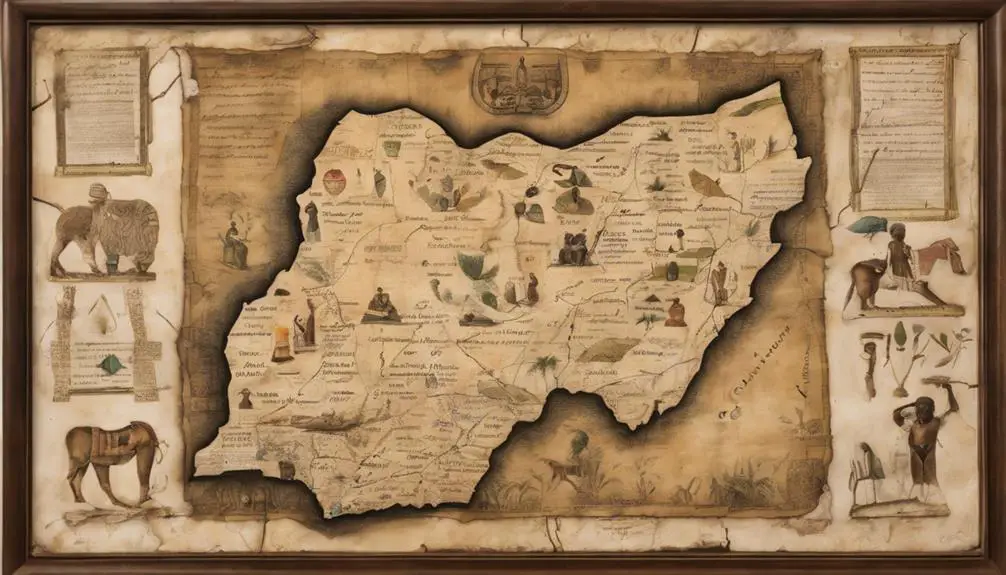
One intriguing aspect of Nigeria's historical and religious landscape is its possible connection to the Lost Tribes of Israel, a topic that's been a source of much debate and scholarly discourse. You might wonder how a West African nation could be linked to the ancient Israelites. It all relates to theories concerning Israelite migration and tribal lineages.
Scholars suggest that some of the Israelite tribes, after being expelled from their homeland, migrated westwards, eventually reaching Africa. Nigeria, with its array of diverse tribes, is seen as a possible settlement for these wandering Israelites. The existence of shared customs, traditions, and linguistic similarities between certain Nigerian tribes and Israelites is often used to substantiate this claim.
It's crucial to understand that these theories, while intriguing, aren't universally agreed upon. They're based on the interpretation of tribal lineages, folklores, and linguistic patterns, which can often be subjective. However, the possibility of Nigeria being a sanctuary for the Lost Tribes of Israel provides a fascinating layer to Nigeria's rich cultural tapestry. It's a hypothesis that continues to inspire research, fostering scholarly dialogue around Nigeria's historical and religious affiliations.
Archeological Evidence and Theories
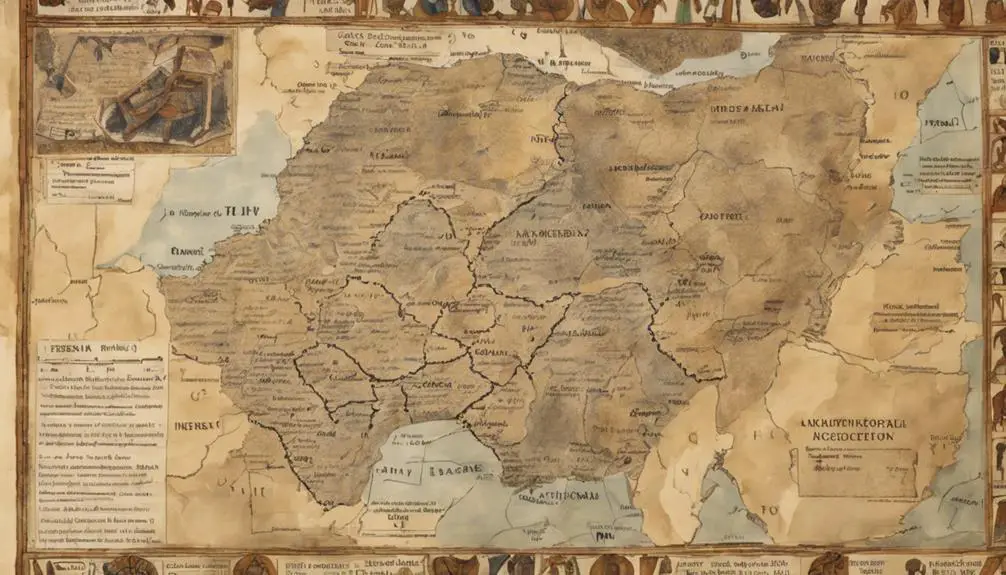
As you probe deeper into Nigeria's historical links with Israel, you'll find a wealth of archeological evidence and theories that further fuel this captivating discourse. Artifacts and architectural remnants excavated from Nigeria's rich soil hint at the presence of ancient cultures that bear striking similarities to those mentioned in Biblical Geography. What's more, some theories suggest these could be the very cultures that played pivotal roles in the formation of African Christianity.
The artifacts include pottery, coins, inscriptions, and even architectural structures that bear uncanny resemblances to those found in ancient Israel. For instance, the Nok culture, dating back to around 500 BC, is known for its terracotta figurines reminiscent of similar artifacts found in Israel.
The connection doesn't end there. Theories revolving around the linguistic similarities between the Yoruba language and ancient Hebrew further stoke the fires of this intriguing dialogue. These theories argue that the Yoruba, an ethnic group in Nigeria, could potentially trace their lineage back to the lost tribes of Israel.
However, it's important to note that while these theories and archeological findings are compelling, they aren't definitive. They offer tantalizing glimpses into the possible links between Nigeria and Biblical Israel, warranting further exploration.
Interpretations and Scholarly Debates
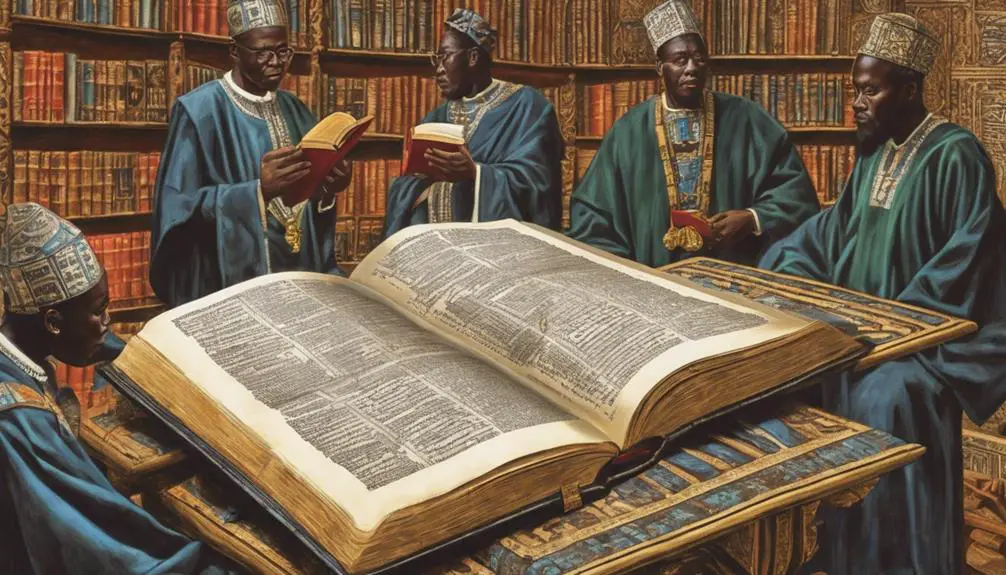
Delving into the realm of interpretations and scholarly debates, you'll discover a panorama of diverse perspectives on Nigeria's historical and potentially biblical connections. Some scholars assert that Nigeria, with its rich and complex history, bears prophetic symbolism in biblical narratives. They argue that the country's ethnic diversity and religious pluralism echo the multicultural and multireligious dynamics of biblical times.
You'll find this view particularly reflected in the works of those who engage in eschatological interpretations. These scholars propose that Nigeria, as a significant African nation, could symbolize a prophetic vision of the future in biblical prophecy. They draw parallels between Nigeria's contemporary struggles with corruption, inequality, and religious conflict and the tribulations foretold in biblical eschatology.
However, these interpretations aren't without controversy. Critics question the validity of such symbolic and prophetic connections, arguing that they're based on subjective interpretations rather than objective historical or archaeological evidence. They caution against the dangers of ethnocentrism and anachronism in biblical interpretation.
In this academic battlefield, you're encouraged to approach these debates with an open mind, weighing the evidence, arguments, and counterarguments to form your own informed opinion.
Frequently Asked Questions
What Are the Common Religious Practices and Beliefs in Modern Nigeria?
In modern Nigeria, you'll find a strong Muslim influence, particularly in the north. You'd observe practices like daily prayers, fasting during Ramadan, and pilgrimage to Mecca.
Also, elements of traditional animism remain, with beliefs in spirits and natural forces. These are often blended with Christian or Islamic practices.
It's a complex mix of faiths, reflecting Nigeria's diverse cultural landscape.
How Has Christianity Influenced Contemporary Nigerian Society?
You're witnessing Christianity's impact on contemporary Nigerian society in various aspects. It's influencing social norms, values, and even politics. Biblical interpretations are used as moral compasses, guiding individuals' behaviors and societal decisions.
From the education system, healthcare, to social services, Christianity's presence is evident. Thus, it's continuously shaping the cultural, political, and societal landscapes of Nigeria, contributing to the country's identity and unity.
Can Any Nigerian Tribal Languages Be Traced Back to Biblical Languages?
While it's fascinating to consider the Biblical Languages Evolution, it's unlikely that Nigerian tribal languages directly trace back to these ancient tongues. Linguistic roots often intertwine and evolve over centuries, making such connections hard to definitively establish.
You'd need extensive etymological studies to draw firm conclusions. So, while there's potentially shared linguistic elements, it's not accurate to claim a direct link without substantial scholarly evidence.
Are There Any Nigerian Traditions or Customs That Are Believed to Be Influenced by Biblical Events or Figures?
You're asking if Nigerian traditions or customs have been influenced by biblical events or figures.
It's interesting to note that some Nigerian festivities do have biblical undertones. For instance, Nigerian cuisine during Christmas often mirrors biblical feasts.
However, it's hard to definitively trace these practices back to specific biblical influences as they've been shaped by a variety of factors over time, including colonial and local cultural influences.
What Is the Nigerian Government's Stance on Religious Education and the Teaching of Biblical History?
You're asking about the Nigerian government's stance on religious education, particularly biblical history. Their policies promote religious freedom, allowing the teaching of various religious doctrines, including Christian biblical history.
However, there's a delicate balance to maintain, as they strive to avoid favoring one religion over another. It's a complex issue, deeply intertwined with Nigeria's diverse religious landscape.
Further research into specific policies would provide more detailed insight.
Conclusion
Drawing from biblical references and historical context, there's potential for Nigeria's links to ancient biblical narratives. Some scholars suggest possible connections to the Lost Tribes of Israel, although this remains debated.
Archaeological evidence provides intriguing, yet inconclusive theories. It's important to interpret these findings within their complex contexts, understanding the multifaceted nature of Nigeria's history.
While Nigeria's biblical connection isn't confirmed, it certainly opens up fascinating avenues of scholarly exploration.


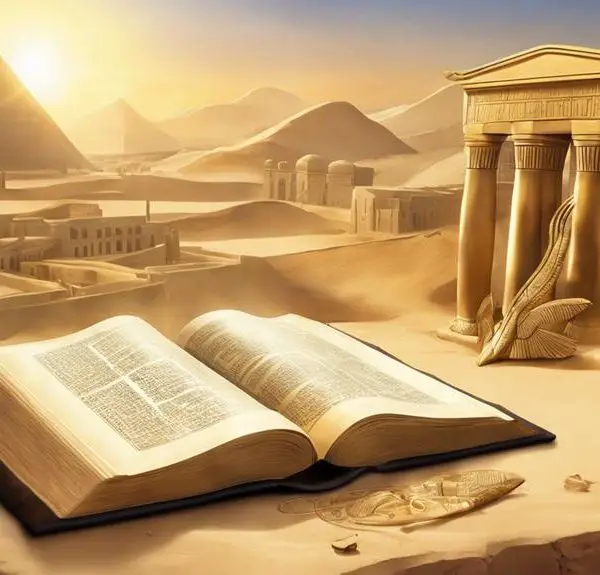
Sign up